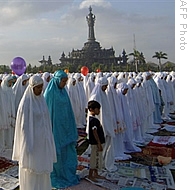VOA标准英语10月-Muslims Around the World Celebrate Eid al-Fitr(在线收听)
 |
| Indonesian Muslims take part in a special morning prayer near Bajrah Sandhi Hindu's temple in Denpasar on Bali island, 01 Oct 2008 |
During the past week, around 26 million Indonesians have flooded airports, seaports, bus and railway stations in an annual exodus to return to their birthplaces to celebrate the end of the fasting month, known as Idul Fitri here.
To the beat of drums and the sounds of firecrackers, Indonesians joyfully celebrated Idul Fitri, Wednesday, after religious leaders sited the new moon the previous night, marking the end of Ramadan.
Many other Muslims, including across much of the Arab world, began the three-day celebration Tuesday, after Muslim scholars there sited the crescent moon on Monday.
Rizal, like millions of Indonesians, was rushing from Jakarta to return to his home province, Batam.
"Idul Fitri means for me - it's a gathering together with my family - all my family, brother, sister - we eat together, we pray together, we have family time together," he said. "That's very, very important."
Going home for Eid al-Fitr is seen as an obligation for Muslims. In Indonesia, the sheer number of people moving about the vast archipelago required the police to mobilize an extra 100,000 people to support the already existing 150,000 police posts set up along the main traveling routes.
Despite the traffic jams, the long queues and the crowded transportation systems, Rizal will put up with any inconvenience, to get home.
"I have to go back to my other province - Batam. My flight, it's this afternoon," he said. "I'm so excited! I have to go because, for me, my Mom, it's very important - my family."
Idul Fitri is also a time for forgiveness. As Rizal explains, it is tradition to ask family and friends for forgiveness for wrongs committed during the past year.
"In the year, somehow we have very bad words to our family, to friends, and Idul Fitri means like a holy thing. So, with friends, family and other relatives, you have like forgiveness," he said. "Forgive to your family, friends, and all of the colleagues and everyone. So, after Idul Fitri, you're back to zero again. Back to zero meaning you don't have any sins."
Families and friends gather for lavish meals, cook traditional food and exchange gifts, mostly in the form of money and new clothes.